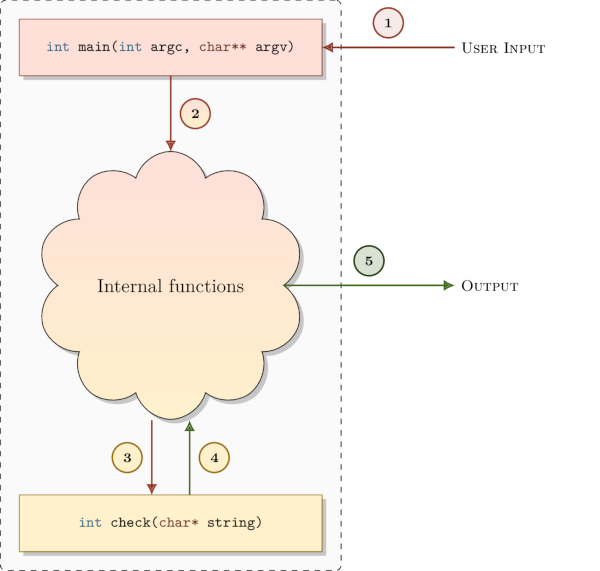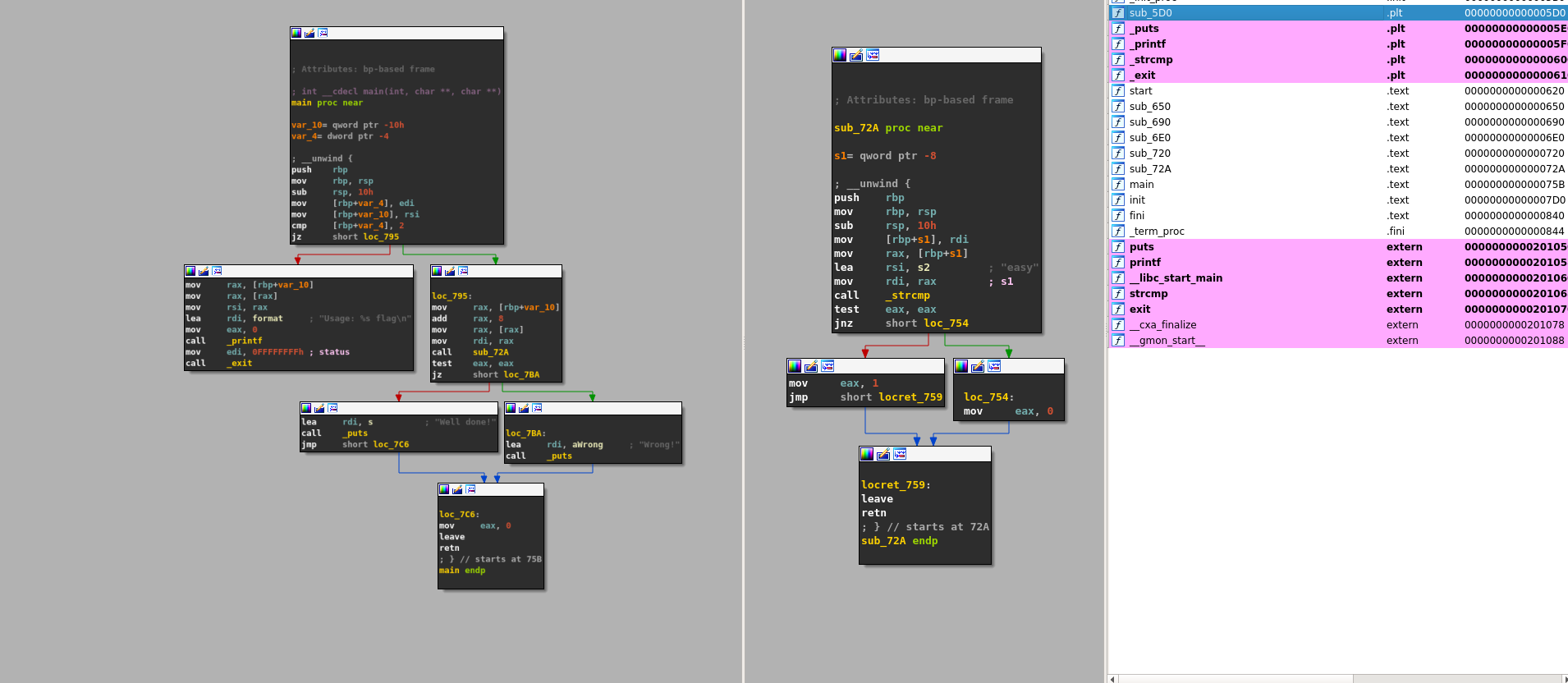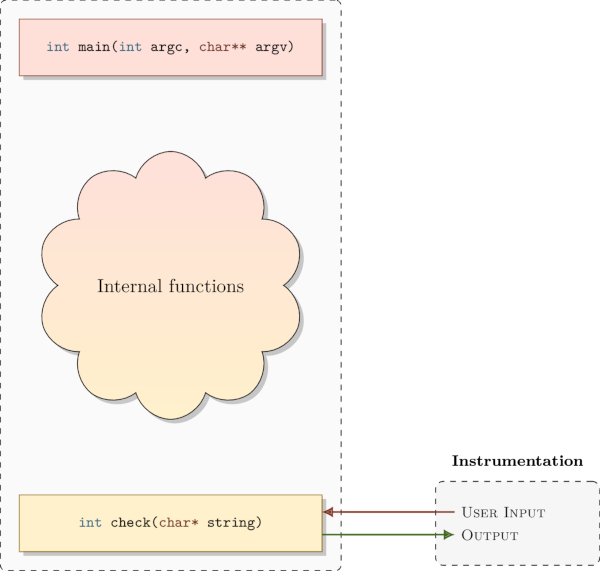08 - Transforming an ELF executable into a library¶
In this tutorial, we will see how to convert a PIE executable into a library
Scripts and materials are available here: materials
By Romain Thomas - @rh0main , updated by Adrien Guinet - @adriengnt
Introduction¶
Actually, if we look at the header of a ELF PIE executable one can notice that it has the same type as a shared object (i.e. library)
$ readelf -h /usr/bin/ssh|grep Type
Type: DYN (Shared object file)
$ readelf -h /usr/lib/libm.so|grep Type
Type: DYN (Shared object file)
Using LIEF we can access this information through the file_type attribute
>>> libm = lief.parse("/usr/lib/libm.so.6")
>>> print(libm.header.file_type)
E_TYPE.DYNAMIC
>>> ssh = lief.parse("/usr/bin/ssh")
>>> print(ss.header.file_type)
E_TYPE.DYNAMIC
The main difference between a PIE binaries and a shared libraries is how symbols are exported.
A shared library aims to expose functions so that executable can bind to it whereas executables shouldn’t not expose functions [1]
It’s confirmed with the number of exported functions in the two different objects:
>>> print(len(libm.exported_functions))
572
>>> print(len(ssh.exported_functions))
10
In this tutorial we will see how we can transform raw function addresses into exported functions associated with a symbol, thus thus exposing internal functions of the executable.
Exporting functions¶
Such transformation can be useful if we found a function at a given address and want to instrument it (using dlopen/dlsym for example). Once the target function is exported we can link it as we would do for a normal library.
For example in a fuzzing scenario if one identifies a function that is a parser, we can export it and then we can feed its inputs with AFL. Thus we cut the path from the normal entrypoint to reach the function.
Let’s see how it works on a basic crackme:
#include <stdlib.h>
#include <stdio.h>
#include <string.h>
#define NOINLINE __attribute__ ((noinline))
NOINLINE int check_found(char* input) {
if (strcmp(input, "easy") == 0) {
return 1;
}
return 0;
}
int main(int argc, char** argv) {
if (argc != 2) {
printf("Usage: %s flag\n", argv[0]);
exit(-1);
}
if (check_found(argv[1])) {
printf("Well done!\n");
} else {
printf("Wrong!\n");
}
return 0;
}
This code takes a string as input and call the check_found function on this string, then it returns 1 if the input is easy. 0 otherwise.
The __attribute__ ((noinline)) is used to make sure the check_found function won’t be inlined by the compiler. Indeed, if the function check is inlined, there won’t be an address associated to this function.
This figure sump-up the execution flow:
The crackme can be compiled with:
$ gcc crackme101.c -O0 -fPIE -pie -Wl,-strip-all,--hash-style=sysv -o crackme101.bin -fvisibility=hidden
$ ./crackme101.bin foo
Wrong!
$ ./crackme101.bin easy
Well done!
Note the usage of the -fvisibility=hidden flag. It makes the compiler not automatically export functions, like the check_found one. By opening crackme101.bin with LIEF, we can check that no functions are exported:
>>> import lief
>>> crackme101 = lief.parse("./crackme101.bin")
>>> print(len(crackme101.exported_functions))
0
Using a disassembler we can quickly identify the check function address:
In this case, the check function is located at the address: 0x72A [2]
Now that we identified the address we can export it as a named function: check_found
>>> crackme101.add_exported_function(0x72A, "check_found")
>>> crackme101.write("libcrackme101.so")
And that all!
libcrackme101.so is now a library that export one function: check_found.
>>> import lief
>>> libcrackme101 = lief.parse("./libcrackme101.so")
>>> print(len(crackme101.exported_functions))
1
>>> print(crackme101.exported_functions[0])
check_found
It turns out that libcrackme101.so is still an executable:
$ ./libcrackme101.so foo
Wrong!
$ ./libcrackme101.so easy
Well done!
Since we have exported a function we can now use dlopen on libcrackme101.so and dlsym on check_found
#include <dlfcn.h>
#include <stdio.h>
#include <stdlib.h>
typedef int(*check_t)(char*);
int main (int argc, char** argv) {
void* handler = dlopen("./libcrackme101.so", RTLD_LAZY);
if (!handler) {
fprintf(stderr, "dlopen error: %s\n", dlerror());
return 1;
}
check_t check_found = (check_t)dlsym(handler, "check_found");
int output = check_found(argv[1]);
printf("Output of check_found('%s'): %d\n", argv[1], output);
return 0;
}
Running the code above should give a similar output:
$ gcc instrument.c -O0 -fPIE -pie -o instrument.bin -ldl
$ ./instrument.bin test
Output of check('test'): 0
$ ./instrument.bin easy
Output of check('easy'): 1
If dlopen returns an error, please read the following section about glibc >= 2.29.
The transformation of the execution flow can be represented as follow:
Warning for glibc >= 2.29 users¶
If you are using glibc >= 2.29 (or a close version depending on your Linux distribution), you might have encountered this error while using the dlopen function:
dlopen error: cannot dynamically load position-independent executable
Loading PIE binaries as shared libraries wasn’t indeed really an intended use case for dlopen, and it used to work without really being properly supported. One of the reasons is that it does not seem that trivial to support all the possible use cases (issues with some relocations and ELF constructors).
These glibc versions now implements a check to deny calls to dlopen with PIE binaries. This is done by verifying the DF_1_PIE flag isn’t present in the list of dynamic information flags.
In order to circumvent this test, LIEF can be used to remove this DF_1_PIE flag:
import lief
import sys
path = sys.argv[1]
bin_ = lief.parse(path)
bin_[lief.ELF.DynamicEntry.TAG.FLAGS_1].remove(lief.ELF.DynamicEntryFlags.FLAG.PIE)
bin_.write(path + ".patched")
Conclusion¶
Because PIE executables aim to be mapped at a random base address, they globally behave as a library. We only need to export the interesting functions.
For non-PIE executables such transformation would be very difficult because it requires to transform first the executable into a relocatable executable. It means creating relocations, patching absolute jump, …
LIEF only support this transformation for ELF and we need to investigate the PE and Mach-O cases [3].
Notes